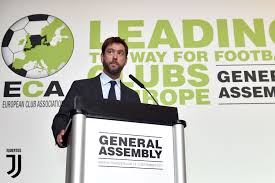By Andrew Warshaw
March 6 – After a relatively quiet few months in the delicate debate over how European club football should be organised in the future, Juventus president Andrea Agnelli has re-stoked the flames of controversy by again making the case for the most prestigious clubs to be commercially prioritised.
In his role as chairman of the European Club Association, Agnelli has made it clear the structure of continental competitions, especially the Champions League, should be changed – and possibly ring-fenced – to give the big guns an increased chance of qualifying.
Agnelli’s push for reform post-2024 has so far been thwarted because of objections by other stakeholders, not least the leagues, but the Italian again questioned the fairness of the current system at the Financial Times Business of Football Summit in London on Thursday.
Agnelli used the example of Atalanta qualifying for the Champions League after finishing third in Italy last season while Roma, a club with a far greater European pedigree, missed out after finishing sixth and had to play in the Europa League.
Atalanta are one step away from making the quarter-finals and have won friends at home and abroad for their style of play. They were the only Italian team to win their first leg in the Champions League last 16, with a 4-1 thrashing of Valencia.
But Agnelli is keen for increased emphasis to be placed on historic performance in determining European qualification.
“I have very high regards for what Atalanta have done, but without European history, with a great performance last year, they have access to international competition. Is that fair or right?” he told delegates. “Then Roma have contributed a lot in maintaining the Italian ranking. They had one bad season, (and they are) out with all the consequent damage to them financially.”
“The point is how we balance the contribution to European football and the performance of a single year.”
“We are discussing the polarization of clubs and how to offer more clubs the opportunity to grow and grow. Today there are big markets and big leagues. Minor leagues have less chance to compete. You can argue that just because you are in a great country you should have an automatic right of access to competitions.”
But that cut no ice with Alberto Colombo, deputy general secretary of the European Leagues who has consistently banged a very different drum, one that allows lesser clubs a greater share of the financial cake.
No sooner had Agnelli completed his keynote address to the summit than Colombo took part in a subsequent panel and gave a somewhat different perspective.
Colombo’s organisation believes awarding more opportunity to clubs simply based on their historic achievement is completely the wrong approach.
“A league at domestic level is an association of clubs,” he argued. “The difference between our position and principles and that of the ECA is our constituency. We should not only ever talk about the top five leagues, we have to talk about all clubs in all leagues around Europe. At the end of the day you have to protect domestic competition based exclusively on sporting merit.”
Agnelli told the summit that medium and small clubs among the ECA’s 200-plus members agreed with the need for reform. But which ones?
“In every league there are top clubs, medium and small clubs,” said Colombo. “There’s a difference between defending the interests of these and protecting the interests exclusively those clubs who participate regularly in UEFA club competitions. It’s important to understand this before we have any concrete proposal.”
“We have a different interpretation of what medium and small clubs actually means. Mr. Agnelli mentioned clubs like Benfica, Celtic and Anderlecht but these, for us, are actually top clubs from medium and smaller leagues. Legia Warsaw, for instance, is the Real Madrid of Poland. Benfica are the Juventus of Portugal.”
Contact the writer of this story at moc.l1745207122labto1745207122ofdlr1745207122owedi1745207122sni@w1745207122ahsra1745207122w.wer1745207122dna1745207122

